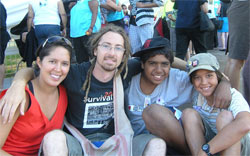 Black and white, we waited like I had waited in the mosh pit for Rage Against the Machine two weeks earlier. Yet the main feature on this day, a day that so many had been waiting for, working for, praying for, was just one word: "Sorry."
Black and white, we waited like I had waited in the mosh pit for Rage Against the Machine two weeks earlier. Yet the main feature on this day, a day that so many had been waiting for, working for, praying for, was just one word: "Sorry."
Matty is one of the many awesome kids in our neighbourhood who don't mind that we are white and often hang out at our houses. As one kid put it, "it's not shame 'cause youse are different." (It must be the dreads.) Matty likes hip hop and reckons Jesus would love Aussie Rules footy (football). Matty just started his first year at high school and though it was a school day, this 13-year-old excitedly wanted me to pick him up before six in the morning so we could get to the Perth foreshore in time because, as Matty told me, "Mum reckons it's important for us."
I added, "I think it's really important for us wadjelas [white people] as well!"
Crammed at the sides of the thousands of people stacked into the "Music Box" before seven in the morning, the crowd was amazingly civil considering the wait: 200 plus years. The first hour of sun light shone through the gum leaves hitting us as we waited to watch Australia's new Prime Minister Kevin Rudd live from Australia's capital. Matty turned to me and said:
"This is history, unna?" ["This has made history, yeah?"]
I heard a number of people, both white and Black, who had been waiting for such a long time, say, "I don't know what to feel." I heard one aboriginal friend put it, "This is a day of celebration!" Yet another friend just down the street said: "I saw it on television and just cried. He's not like most them that are all talk no action. I couldn't stop crying. I just kept thinking of mum and my dad, my cousins. All ripped away from home and family."
She shared later, "things are different now." Somehow wrapped up in this one little word, "sorry," was a new future. This strong aboriginal woman, who I'm proud to call my friend, was saying that in this word a new day is possible for her people and our nation. In this word, grief can now find its energy in change rather than despair. The cries of mothers who have had their babies torn from their arms and stolen from their breast have finally reached the halls of government. And miraculously, government has started to repent from the legacy of racism and colonialism.
Yet Matty's question still hangs in the air: "This is history, unna?"
If we think a couple of speeches is going to solve a history of genocide and colonization or the reality that Indigenous Australians die 17 years earlier on average than the rest the country; or the poverty of remote indigenous communities in one of the richest countries on earth; or the fact that when I go into prisons in Australia I see white systemic sin expressed in black incarceration, my answer to Matty is, "no." A number of years back, the famous indigenous activist "Uncle Kev" Buzzacott told me while we were on a Peace Pilgrimage that, "It's recon-silly-ation if reconciliation talk doesn't come with justice for us."
Yet, if instead, "sorry" is a call to enact real reconciliation which is not seeking to appease one's guilt but seeking to put right the wrong we have done, my answer is, "yes." If "sorry" looks like the healing justice we see in Christ and experience in relationship with God, and have seen in the ministry of peacemakers like Dr. Rev. Martin Luther King Jr., Bishop Desmond Tutu, and many others, my answer to Matty is, "yes."
By God's grace, maybe the call to action and healing which has started to flow out of Sorry Day can be an icon for the church to hear how the cross and the empowerment of grace is a call to active witness to the ministry of reconciliation that is ours in Christ. I think on Sorry Day I heard afresh from the empty tomb the whisper of the Holy Spirit in the words of a 13-year-old Indigenous boy asking if my life witnessed too:
"This is history unna?"
Jarrod McKenna is seeking to live God's love. He's a co-founder of the Peace Tree Christian Commune serving the marginalized in one of the poorest of areas in his city, and is the founder and creative director of Empowering Peacemakers (EPYC), for which he has received an Australian peace award in his work for peace and (eco)justice.
Got something to say about what you're reading? We value your feedback!